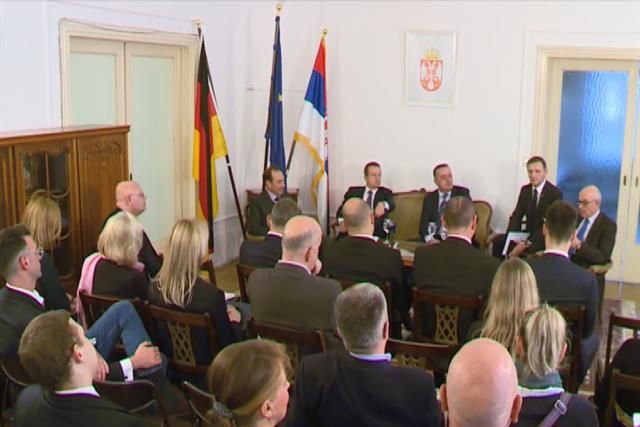



| Monday, 08 April 2019. | |
| Minister Dacic with members of the "Berlin Business Talks" | |
| + larger fontnormal font- Smaller font | |||
 Address by First Deputy Prime Minister and Minister of Foreign Affairs Ivica Dacic to the Berlin Business Talks Association members, at a reception hosted by the Embassy of Serbia in Berlin: Address by First Deputy Prime Minister and Minister of Foreign Affairs Ivica Dacic to the Berlin Business Talks Association members, at a reception hosted by the Embassy of Serbia in Berlin:"Ladies and gentlemen, Dear friends, Dear guests, At the outset, I would like to thank Mr. Becker for his kind invitation and another opportunity to have discussions. My colleague, Minister Antic and I are visiting Berlin to participate in the international conference on energy transition. Our foreign policy priority is EU membership. It is clear that we belong to that part of Europe and our goal is to become a full-fledged member of the EU as soon as possible. Many are the challenges and problems we face, some being in our region and some in the EU itself. In some countries, EU member states, there is certain scepticism towards the enlargement and admission of new members. On the other hand, in the countries of our region there is a fatigue from the enlargement story as this has been talked about for years and decades. There are also countries that wish to exit the EU, such as the United Kingdom the example of which demonstrates how complicated the situation is, but this does not affect our foreign policy goal, which is full European Union membership.
Nevertheless, the situation on the ground is not as it seems. They have not managed to round off the process of independence in the last ten to eleven years. They have not been admitted to the United Nations, they cannot become an OSCE participating state, a member of the Council of Europe, and they cannot become an EU member state, either, because 5 EU member countries do not recognize it. Claims that 116 countries recognized it are sheer lies. The more you talk to those countries with which no representative from Serbia had discussions in the past, the more they become aware of the problems they face in their own countries because of the Kosovo case. Catalonia wishes to follow in the footsteps of Kosovo, through unilateral acts, without an agreement with Madrid. Serbia seeks a compromise. Cardinal Richelieu said that a compromise is a deal where each party gets a bit of what it did not want. We are very pleased with the ascending line of our bilateral relations with the Federal Republic of Germany. They have been significantly improved in recent years. As regards the economy, reforms are being implemented in Serbia. Serbia has undertaken bold economic and structural reforms related to fiscal consolidation and improvement of the conditions for promoting an investment climate. Indicators show that these measures have yielded results: the consolidated budget deficit of 6.2% of GDP in 2014 was turned into a surplus, and the share of public debt in the GDP was reduced from 71.2% in 2015 to 54.5 % in 2018. Economic growth was 4.3% in 2018. There is a steady increase in exports. Unemployment rate dropped from 23.9% in 2012 to 12.9% in 2018. Serbia has progressed 43 places in the last 4 years on the World Bank's Doing Business List and now takes 48th place. Over 400 German companies, employing about 60 thousand workers, operate in Serbia. In that context, Germany is among Serbia's leading trading partners. In 2018, foreign trade achieved record performance results: total exchange amounted to about 5 billion euros. Export of industrial goods accounts for 91.1% of all our exports, while agricultural food products make up about 8.9% of our exports. The share of Serbia's trade with Germany is 12.8% of our total international trade. Exports to Germany account for 11.9% of all Serbian exports, while imports from Germany take around 13.4% of all imports to Serbia. Most German investments were in the manufacturing sector, with the most important investors being STADA, METRO, Messer/Tehnogas, Henkel, Siemens, Bosch and LEONI. One of the key areas for investment cooperation is the automotive industry (Bosch, LEONI, Draexlmaier, Grammer, Norma Group, Continental-ContiTech, Bauerhin, Johnson Electric). I hope that in the near future we will be able to welcome another big car manufacturing group in Europe and the world. Serbia is ready to offer favourable business conditions to German investors and our key interests are to increase investments in infrastructure projects, cooperation in the fields of car making and energy, agriculture and food, IT and tourism. We attach great importance to digital agenda and export of our IT industry is on a very high level. We are ready to make every effort to develop our economic relations because we consider Germany as our key foreign policy partner. I would also like to invite you to come to Serbia. There is an impressive German business community in Serbia and I hope that you will become part of it. You will certainly receive Serbian hospitality and see for yourself the desire to develop the best possible relations. Thank you." |